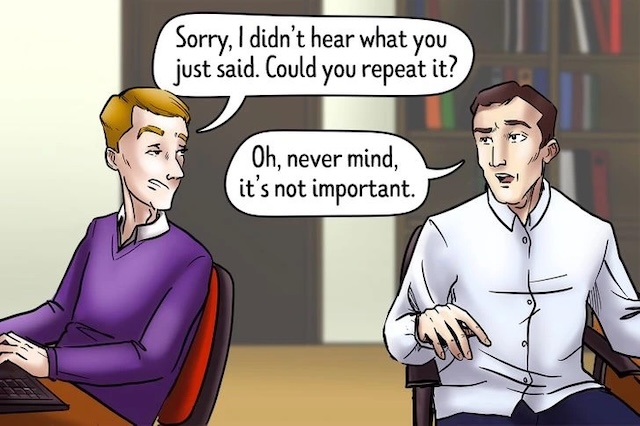Rude comments are an unfortunate part of life. From an inappropriate remark at work to unsolicited advice from a relative, these moments can catch us off guard and leave us flustered. The good news? You can navigate these situations with poise and turn them into opportunities to showcase emotional intelligence. Here are 20 effective strategies to help you respond calmly to rude remarks while maintaining your dignity.

1. Respond with a Counter-Question
When faced with invasive questions about your personal life, a great way to deflect is by responding with a thoughtful counter-question. For example, if someone pries into your choices, you might ask, “Why do you ask?” This puts the spotlight back on them, subtly signaling their question might be inappropriate.
2. Disarm with a Simple “Thank You”

Sometimes, the best way to counter negativity is with kindness. A simple “thank you” can catch the other person off guard and show that you’re unaffected. For instance, if someone makes a sarcastic comment about your appearance, replying with a calm “Thank you, I appreciate that” can shift the power dynamic in your favor.
3. Use Neutral Responses to Stay in Control

Neutral phrases like “I see” or “That’s interesting” are excellent tools to keep the peace. They acknowledge the remark without escalating the situation, allowing you to retain your composure.
4. Highlight the Positive and Ignore the Negative

When someone gives you a backhanded compliment, focus on the positive part. For instance, if they say, “You’re doing well for someone your age,” simply respond with, “Thanks, I’ve worked really hard.” This tactic sidesteps the negativity and emphasizes your achievements.
5. Redirect the Conversation with a Compliment

A great way to deflect rudeness is by steering the conversation toward something positive. If someone criticizes your lifestyle, you could redirect by complimenting their outfit or recent accomplishments. This subtle shift changes the tone and diffuses tension.
6. Assert Your Boundaries Calmly

If a comment crosses the line, it’s okay to address it directly. For instance, you could say, “I’d prefer we stick to respectful conversations.” This response is firm yet non-confrontational, making your boundaries clear.
7. Emphasize Respectful Behavior

When someone’s remarks feel judgmental, gently redirect the conversation to the importance of kindness. For example, you might say, “I think it’s important we focus on lifting each other up.” This not only sets a positive tone but subtly calls out their negativity.
8. Employ Sarcasm as a Defense Mechanism

A well-placed sarcastic remark can diffuse tension while sending a clear message. For example, if someone makes a cutting remark, a light-hearted response like, “Wow, you’ve really outdone yourself with that one” can disarm them without escalating the situation.
9. Respond Assertively to Judgmental Remarks

When someone judges your decisions, stay calm and reply with confidence. For instance, you might say, “I’m happy with my choices, but thanks for your concern.” This response shows you’re secure in your decisions and not easily swayed by criticism.
10. Acknowledge Concern While Setting Boundaries

If someone close to you makes a critical comment, acknowledge their concern but set clear limits. For example, “I appreciate that you care, but I’d rather not discuss this topic right now.” This balances gratitude with assertiveness.
11. Call Out Non-Constructive Feedback

When someone offers disguised insults as “constructive criticism,” respond by pointing out the lack of helpfulness. You could say, “I appreciate feedback, but I’m looking for something more constructive.” This encourages meaningful dialogue and discourages passive-aggressiveness.
12. Show Appreciation Without Agreeing

A neutral response like, “I appreciate your perspective” acknowledges the other person’s opinion without conceding. It keeps the conversation polite while reinforcing your confidence.
13. Use Humor to Deflect Insults

Humor is a fantastic tool to lighten the mood. If someone makes a rude comment, a witty retort like, “Oh, I didn’t realize you were my personal coach!” can diffuse tension and show that you’re unbothered.
14. Pretend Not to Hear and Ask Them to Repeat

If a comment feels too rude, act as though you didn’t hear it and ask them to repeat. Most people will reconsider their words when given a second chance.
15. Shift the Topic to Avoid Conflict

Redirecting the conversation is a subtle way to diffuse rudeness. For instance, if someone comments on your choices, change the topic by saying, “Speaking of decisions, have you tried that new restaurant downtown?”
16. Own Your Emotions Confidently

If someone accuses you of being too sensitive, calmly assert your emotions. Respond with, “I’m comfortable expressing how I feel, and I hope you can respect that.” This shows emotional intelligence and self-assurance.
17. Add a Touch of Irony
Irony can be a playful way to respond to overbearing comments. For example, if someone questions your decisions, you might say, “You’re right, I should have consulted the expert panel first!”
18. Address the Behavior Directly When Needed

If rudeness persists, address it firmly but respectfully. For example, “I’ve noticed a pattern of comments that feel dismissive. Can we work on keeping things more positive?” This approach fosters accountability.
19. Keep It Short with an “Okay”
Sometimes, the simplest response is best. A neutral “okay” followed by moving on sends a strong message that their remark isn’t worth your time or energy.
20. Maintain Wit to Reassert Control

A clever, confident remark can turn the tables on rudeness. For instance, “Thanks for the feedback—always nice to know someone’s paying attention!” This light response disarms negativity while keeping the tone light.
Conclusion
Handling rude comments doesn’t mean stooping to the same level. By staying calm, confident, and composed, you not only protect your peace but also set an example of how to navigate difficult interactions with grace. These strategies empower you to take control, establish boundaries, and foster respectful conversations in every situation


